A) Is it possible for specialization and trade to benefit more than one party to a trade?
B) Is it possible for specialization and trade to increase total output of traded goods?
C) Do opportunity costs play a role in people's decisions to specialize in certain activities?
D) What determines the price at which trade takes place?
F) B) and C)
Correct Answer

verified
Correct Answer
verified
Multiple Choice
Figure 3-19
Chile's Production Possibilities Frontier
Colombia's Production Possibilities Frontier 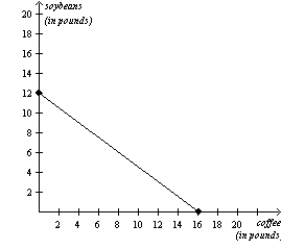
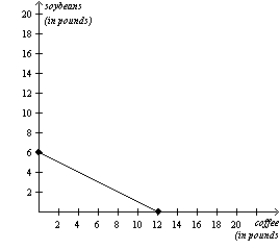 -Refer to Figure 3-19.Chile's opportunity cost of one pound of soybeans is
-Refer to Figure 3-19.Chile's opportunity cost of one pound of soybeans is
A) 3/4 pound of coffee and Colombia's opportunity cost of one pound of soybeans is 1/2 pound of coffee.
B) 3/4 pound of coffee and Colombia's opportunity cost of one pound of soybeans is 2 pounds of coffee.
C) 4/3 pounds of coffee and Colombia's opportunity cost of one pound of soybeans is 1/2 pound of coffee.
D) 4/3 pounds of coffee and Colombia's opportunity cost of one pound of soybeans is 2 pounds of coffee.
F) B) and D)
Correct Answer

verified
Correct Answer
verified
Multiple Choice
Figure 3-21
Uzbekistan's Production Possibilities Frontier
Azerbaijan's Production Possibilities Frontier 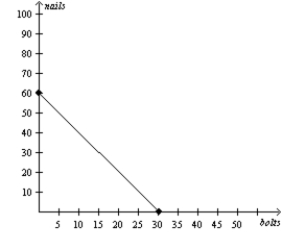
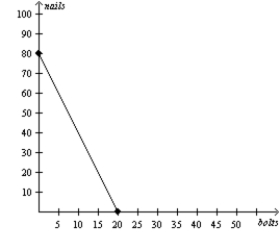 -Refer to Figure 3-21.Without trade,Uzbekistan produced and consumed 12 bolts and 36 nails and Azerbaijan produced and consumed 14 bolts and 24 nails.Then,each country agreed to specialize in the production of the good in which it has a comparative advantage and trade 16 bolts for 38 nails.As a result,Uzbekistan gained
-Refer to Figure 3-21.Without trade,Uzbekistan produced and consumed 12 bolts and 36 nails and Azerbaijan produced and consumed 14 bolts and 24 nails.Then,each country agreed to specialize in the production of the good in which it has a comparative advantage and trade 16 bolts for 38 nails.As a result,Uzbekistan gained
A) 2 bolts and 2 nails and Azerbaijan gained 2 bolts and 18 nails.
B) 4 bolts and 2 nails and Azerbaijan gained 2 bolts and 14 nails.
C) 14 bolts and 38 nails and Azerbaijan gained 16 bolts and 42 nails.
D) 16 bolts and 38 nails and Azerbaijan gained 16 bolts and 38 nails.
F) A) and C)
Correct Answer

verified
Correct Answer
verified
Multiple Choice
Suppose that a worker in Radioland can produce either 4 radios or 1 television per year,and a worker in Teeveeland can produce either 2 radios or 4 televisions per year.Each nation has 100 workers.Also suppose that each country completely specializes in producing the good in which it has a comparative advantage.If Radioland trades 100 radios to Teeveeland in exchange for 100 televisions each year,then each country's maximum consumption of new radios and televisions per year will be
A) 100 radios,300 televisions in Radioland and 300 radios,100 televisions in Teeveeland.
B) 300 radios,100 televisions in Radioland and 100 radios,300 televisions in Teeveeland.
C) 200 radios,100 televisions in Radioland and 100 radios,200 televisions in Teeveeland.
D) 300 radios,100 televisions in Radioland and 100 radios,400 televisions in Teeveeland.
F) B) and C)
Correct Answer

verified
Correct Answer
verified
Multiple Choice
Suppose that a worker in Cornland can grow either 40 bushels of corn or 10 bushels of oats per year,and a worker in Oatland can grow either 20 bushels of corn or 5 bushels of oats per year.There are 20 workers in Cornland and 20 workers in Oatland.Which of the following statements is true?
A) Both countries could gain from trade with each other.
B) Neither country could gain from trade with each other because Cornland has an absolute advantage in both goods.
C) Neither country could gain from trade with each other because neither one has a comparative advantage.
D) Oatland could gain from trade between the two countries,but Cornland definitively would lose.
F) None of the above
Correct Answer

verified
Correct Answer
verified
Multiple Choice
When describing the opportunity cost of two producers,economists use the term
A) natural advantage.
B) trading advantage.
C) comparative advantage.
D) absolute advantage.
F) B) and D)
Correct Answer

verified
Correct Answer
verified
Multiple Choice
Assume that Greece has a comparative advantage in fish and Germany has a comparative advantage in cars.Also assume that Germany has an absolute advantage in both fish and cars.If these two countries specialize and trade so as to maximize the benefits of specialization and trade,then
A) the two countries' combined output of both goods will be higher than it would be in the absence of trade.
B) Greece will produce more fish than it would produce in the absence of trade.
C) Germany will produce more cars than it would produce in the absence of trade.
D) All of the above are correct.
F) A) and C)
Correct Answer

verified
Correct Answer
verified
Multiple Choice
Figure 3-20
Canada's Production Possibilities Frontier
Mexico's Production Possibilities Frontier 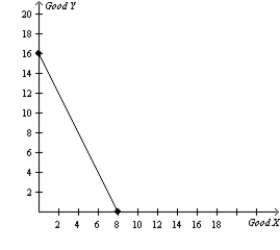
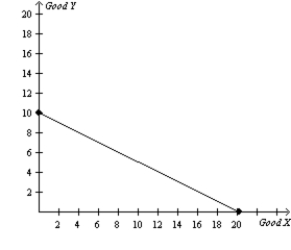 -Refer to Figure 3-20.If Canada and Mexico switch from each country dividing its time equally between the production of Good X and Good Y to each country spending all of its time producing the good in which it has a comparative advantage,then total production of Good Y will increase by
-Refer to Figure 3-20.If Canada and Mexico switch from each country dividing its time equally between the production of Good X and Good Y to each country spending all of its time producing the good in which it has a comparative advantage,then total production of Good Y will increase by
A) 3 units.
B) 6 units.
C) 9 units.
D) 12 units.
F) A) and B)
Correct Answer

verified
Correct Answer
verified
Multiple Choice
Figure 3-22
Alice and Betty's Production Possibilities in one 8-hour day.
Alice's Production Possibilities Frontier
Betty's Production Possibilities Frontier 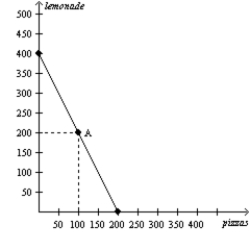
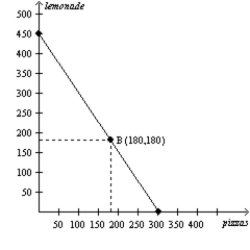 -Refer to Figure 3-22.What are Alice and Betty's opportunity costs of 1 pizza?
-Refer to Figure 3-22.What are Alice and Betty's opportunity costs of 1 pizza?
A) Alice's opportunity cost of 1 pizza is 1/2 of a pitcher of lemonade and Betty's opportunity cost of 1 pizza is 2/3 of a pitcher of lemonade.
B) Alice's opportunity cost of 1 pizza is 1 pitcher of lemonade and Betty's opportunity cost of 1 pizza is 3 pitchers of lemonade.
C) Alice's opportunity cost of 1 pizza is 2 pitchers of lemonade and Betty's opportunity cost of 1 pizza is 1.5 pitchers of lemonade.
D) Alice's opportunity cost of 1 pizza is 400 pitchers of lemonade and Betty's opportunity cost of 1 pizza is 450 pitchers of lemonade.
F) A) and C)
Correct Answer

verified
Correct Answer
verified
Multiple Choice
If Shawn can produce donuts at a lower opportunity cost than Sue,then
A) Shawn has a comparative advantage in the production of donuts.
B) Sue has a comparative advantage in the production of donuts.
C) Shawn should not produce donuts.
D) Shawn is capable of producing more donuts than Sue in a given amount of time.
F) All of the above
Correct Answer

verified
Correct Answer
verified
Multiple Choice
Which of the following statements is not correct?
A) Trade allows for specialization.
B) Trade has the potential to benefit all nations.
C) Trade allows nations to consume outside of their production possibilities curves.
D) Absolute advantage is the driving force of specialization.
F) None of the above
Correct Answer

verified
Correct Answer
verified
Multiple Choice
Figure 3-23
The graph below represents the various combinations of ham and cheese (in pounds) that the nation of Bonovia could produce in a given month. 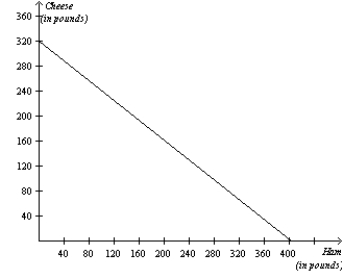 -Refer to Figure 3-23.In the nation of Cropitia,the opportunity cost of a pound of ham is 0.3 pounds of cheese.Bonovia and Cropitia both can gain from trading with one another if one pound of ham trades for
-Refer to Figure 3-23.In the nation of Cropitia,the opportunity cost of a pound of ham is 0.3 pounds of cheese.Bonovia and Cropitia both can gain from trading with one another if one pound of ham trades for
A) 0.40 pounds of cheese.
B) 0.55 pounds of cheese.
C) 0.75 pounds of cheese.
D) All of the above are correct.
F) B) and D)
Correct Answer

verified
Correct Answer
verified
Multiple Choice
Figure 3-20
Canada's Production Possibilities Frontier
Mexico's Production Possibilities Frontier 
 -Refer to Figure 3-20.At which of the following prices would both Canada and Mexico gain from trade with each other?
-Refer to Figure 3-20.At which of the following prices would both Canada and Mexico gain from trade with each other?
A) 9 units of Good Y for 6 units of Good X
B) 8 units of Good Y for 20 units of Good X
C) 70 units of Good Y for 30 units of Good X
D) Canada and Mexico could not both gain from trade with each other at any price.
F) None of the above
Correct Answer

verified
Correct Answer
verified
Multiple Choice
Suppose that the country of Xenophobia chose to isolate itself from the rest of the world.Its ruler proclaimed that Xenophobia should become self-sufficient,so it would not engage in foreign trade.From an economic perspective,this idea would
A) make sense if Xenophobia had an absolute advantage in all goods.
B) make sense if Xenophobia had no absolute advantages in any good.
C) not make sense as long as Xenophobia had a comparative advantage in some good.
D) not make sense as long as Xenophobia had an absolute advantage in at least half the goods that could be traded.
F) None of the above
Correct Answer

verified
Correct Answer
verified
Multiple Choice
The principle of comparative advantage does not provide answers to certain questions.One of those questions is
A) Do specialization and trade benefit more than one party to a trade?
B) Is it absolute advantage or comparative advantage that really matters?
C) How are the gains from trade shared among the parties to a trade?
D) Is it possible for specialization and trade to increase total output of traded goods?
F) None of the above
Correct Answer

verified
Correct Answer
verified
Multiple Choice
Figure 3-16
Hosne's Production Possibilities Frontier
Merve's Production Possibilities Frontier 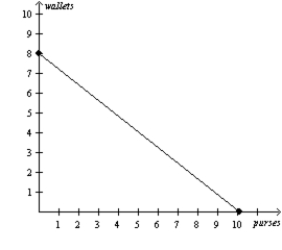
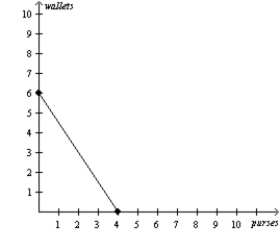 -Refer to Figure 3-16.Hosne's opportunity cost of one wallet is
-Refer to Figure 3-16.Hosne's opportunity cost of one wallet is
A) 4/5 purse and Merve's opportunity cost of one wallet is 2/3 purse.
B) 4/5 purse and Merve's opportunity cost of one wallet is 3/2 purses.
C) 5/4 purses and Merve's opportunity cost of one wallet is 2/3 purse.
D) 5/4 purses and Merve's opportunity cost of one wallet is 3/2 purses.
F) All of the above
Correct Answer

verified
Correct Answer
verified
Multiple Choice
Figure 3-17
Maxine's Production Possibilities Frontier
Daisy's Production Possibilities Frontier 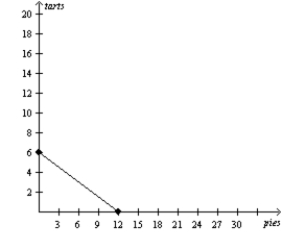
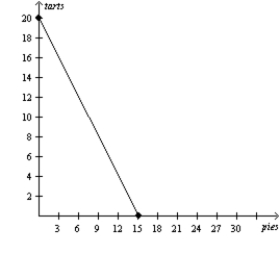 -Refer to Figure 3-17.At which of the following prices would both Maxine and Daisy gain from trade with each other?
-Refer to Figure 3-17.At which of the following prices would both Maxine and Daisy gain from trade with each other?
A) 4 tarts for 2 pies
B) 8 tarts for 12 pies
C) 12 tarts for 28 pies
D) Maxine and Daisy could not both gain from trade with each other at any price.
F) A) and B)
Correct Answer

verified
Correct Answer
verified
Multiple Choice
Figure 3-17
Maxine's Production Possibilities Frontier
Daisy's Production Possibilities Frontier 
 -Refer to Figure 3-17.Maxine has an absolute advantage in the production of
-Refer to Figure 3-17.Maxine has an absolute advantage in the production of
A) both goods and a comparative advantage in the production of pies.
B) both goods and a comparative advantage in the production of tarts.
C) neither good and a comparative advantage in the production of pies.
D) neither good and a comparative advantage in the production of tarts.
F) A) and C)
Correct Answer

verified
Correct Answer
verified
Multiple Choice
Both Dave and Caroline produce sweaters and socks.If Dave's opportunity cost of 1 sweater is 3 socks and Caroline's opportunity cost of 1 sweater is 5 socks,then
A) Dave has a comparative advantage in the production of sweaters.
B) Caroline has a comparative advantage in the production of sweaters.
C) Dave has a comparative advantage in the production of socks.
D) Dave has a comparative advantage in the production of both sweaters and socks.
F) A) and B)
Correct Answer

verified
Correct Answer
verified
Multiple Choice
Figure 3-15
Perry's Production Possibilities Frontier
Jordan's Production Possibilities Frontier 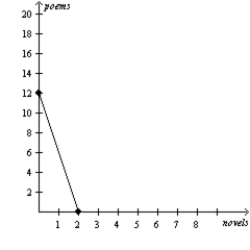
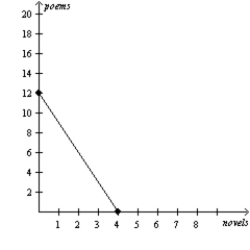 -Refer to Figure 3-15.Perry has an absolute advantage in the production of
-Refer to Figure 3-15.Perry has an absolute advantage in the production of
A) novels and Jordan has an absolute advantage in the production of poems.
B) poems and Jordan has an absolute advantage in the production of novels.
C) novels and Jordan has an absolute advantage in the production of neither good.
D) neither good and Jordan has an absolute advantage in the production of novels.
F) A) and C)
Correct Answer

verified
Correct Answer
verified
Showing 41 - 60 of 141
Related Exams